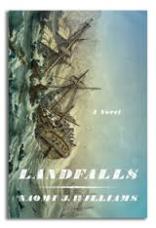 Landfalls, by Naomi J. Williams, is one of those strange novels that creep up on you without you realizing. I’ve experienced this before, but with Landfalls, it was particularly striking. I was more than three quarters of the way through before it suddenly hit me that I was reading something remarkable. It’s not that the first half of the book isn’t remarkable, it’s more that Landfalls’ effectiveness is extremely subtle and takes some time to recognize.
Landfalls, by Naomi J. Williams, is one of those strange novels that creep up on you without you realizing. I’ve experienced this before, but with Landfalls, it was particularly striking. I was more than three quarters of the way through before it suddenly hit me that I was reading something remarkable. It’s not that the first half of the book isn’t remarkable, it’s more that Landfalls’ effectiveness is extremely subtle and takes some time to recognize.
Each chapter of Landfalls is told from the point of view of a different character and each chapter could pass as an independent short story. This unique structure worked well for Landfalls because it highlights character development, which to me was the heart of the novel. Williams’ exploration of different characters’ world views, beliefs, and motivations (particularly those of the two captains), and how they evolve and are changed by the course of the voyage, is spectacular. What makes Landfalls so successful is Williams’ ability to portray characters living at the end of the 18th century authentically while still making room for modern thought. Writing historically accurate characters that are both sympathetic and relatable in a time period when racism was the norm and slavery widely accepted, is a real challenge. Often historical fiction can suffer from feeling either too influenced by modern thought or too stuck in the past. Williams gets the balance just right, and this allows for fascinating (and believable!) character development.
Because Landfalls is essentially a series of related short stories, you will likely have a favorite standout chapter, as I did. My personal favorite chapter was “Dispatches,” in which the Russian-speaking crew member of the voyage is dropped off on the eastern coast of Siberia and entrusted with a box of documents detailing the findings of the voyage so far should the crew not successfully return to France (which, of course, they did not). In “Dispatches,” Williams develops a deep and loyal relationship between men relying on each other for survival. This chapter highlights one of the my favorite themes in the novel, which is exploring how relationships functioned in a time before immediate long-distance communication was possible. Today it seems so strange – the inability to speak to someone who isn’t directly in front of you – but for almost all of history that is simply the way it was. At the end of “Dispatches,” two friends who had travelled across Siberia and survived against the odds part ways knowing they’ll never meet again. Landfalls is full of these powerful moments that explore humanity and human relationships.
Landfalls has a way of sneaking up on you, and reminding you of the things that become so easy to forget in the 21st century: the power of nature and its indifference toward the people living in it, how big the world is, and how small our little piece of it, how brief human life is, but how powerful an impact one individual can have on those around them. I’ll end this review with a short and simple but thought-provoking quote that I feel exemplifies Landfalls:
“The Vanikorans [a small Polynesian island people] understood their island to be one of many that made up the world.” (256)
Links: Naomi J Williams .com | Goodreads | Amazon
